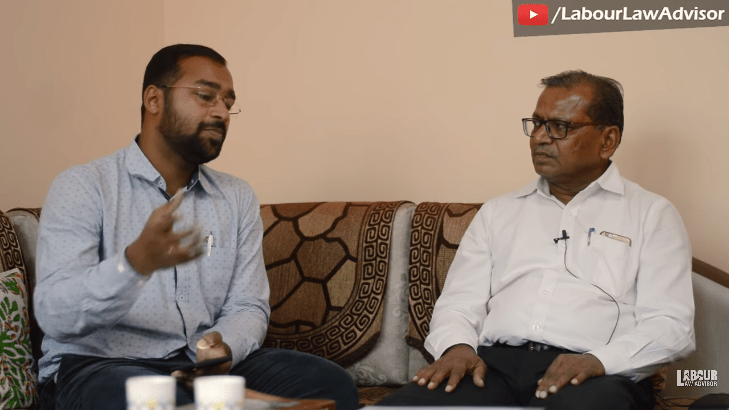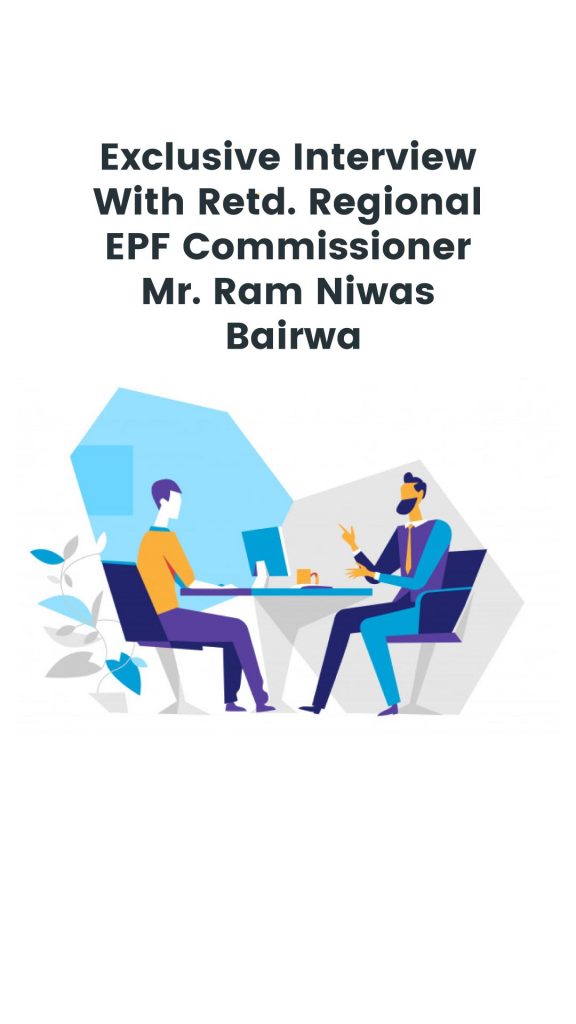We had the exclusive opportunity to sit down and interview Mr. Ram Niwas Bairwa. Ram Niwas Bairwa is a retired Regional EPF Commissioner. He worked with the EPFO from 1970 to 2012. He has been involved with PF training for 18 years. Owing to his vast experience in the field, he has also authored some 13-14 books on EPF. We sat down for a tête-à-tête with Mr Bairwa and asked him few pertinent questions regarding PF and Pension. Read excerpts from the interview below.

Table of Contents
Excerpts from interview with Mr Ram Niwas Bairwa
Q: What bifurcation should employer follow for PF charges on salary?
Ram Niwas Bairwa: Section 2 of the EPF Act states the definition of wages and Section 2 states the bifurcation of salary for following PF contribution. PF is charged on the dearness allowance, food concession, basic and retaining allowance of the salary. The Supreme Court made a ruling earlier which states that excluded items of salary are not to be included in PF contribution. Only the allowances made to an employee to sustain his living expenses are to be included in PF contribution. This order should help avoid any confusions towards basic wages of the salary.
Q: Sometimes employers reduce Basic+DA charges or do not calculate PF on any salary bifurcation at all. So, is there any given limit on salary for charging PF contribution?
Ram Niwas Bairwa: Earlier, different industries in India would have a wage board to follow bifurcation of basic and DA on salary. But this routine is no longer followed in recent times. As a result, the bifurcation of salary is completely up to the employer. Even then, the standing orders of a company have to be approved by the Labour Commissioner to be legally implemented. These standing orders have the bifurcation of wages given in detail.
Secondly, companies now have a CTC provision for employees. The CTC has clear mentions of all the parts of employee’s salary – the different allowances he will get and different contributions towards labour laws he will be charged. Lastly, employees are usually paid well nowadays with few people having a monthly salary below Rs 15,000. Only when someone is earning below Rs 15,000 do you need to see how much PF contribution to deduct. It is normal to take 40-50% of salary as basic wages in today’s time.
Q: As each state has a stated minimum wage, so is it compulsory to follow that for PF contribution? Will minimum wages come under basic wages or gross salary?
Ram Niwas Bairwa: Constitutionally speaking, living wages account for the expenses an individual needs to cover to live a respectable life. But minimum wages are actually lower than living wages. Paying lower than minimum wages will make it difficult for an employee to sustain a normal life. Thus, it is mandatory to pay PF contribution on at least the minimum wages of the employee. This also lends employee a sense of social security to have a guaranteed pension post retirement.
Q: Some companies hire interns on stipends. Is it compulsory to pay PF on intern stipends as well?
Ram Niwas Bairwa: Employers should move ahead with the idea of compliance of labour laws rather than avoidance. The PF Act clearly states the definition of “employee” as someone who works for an employer either inside or outside the company premises and receives a salary for it. But trainees are not included in the definition of employees. Trainees also include apprentices. Additionally, a company must have clear rules and regulations for trainees and apprentices in their standing orders under a Training Program. This training program must mention the different stages of training, the duration of training and payment. Without that, they will not be legally seen as trainees.

Q: What are some of the major Amendments of 2014 in the EPF Act and EPS Pension Yojana that we should know about?
Ram Niwas Bairwa: Regarding PF, there has been a cap on Rs 15000 salary. Under EDLI, the minimum insurance cover has been raised from Rs 2.5 lakh to Rs 6 lakh. As for Pension Scheme, employees can now pay pension contribution without a limit to get higher pension. Secondly, if an employee retires at 58 years, then he can postpone his monthly pension for 2 more years. Upon postponing he will receive 4% higher pension for every year after 60 years of age. Moreover, a person retiring at59 years also has the option to continue paying pension contribution until 60 years of age. This will benefit employee by getting higher pension.
Q: Can an employee be covered under the EPS Pension Scheme if his PF wages is more than Rs 15000?
Ram Niwas Bairwa: Employees joining PF after 2014 and earning more than Rs 15,000 will not become Pension Scheme members. This amendment was brought about on 1st September 2014. Moreover, employees already paying higher pension contribution can continue doing so.
Q: What should employees do if their employer is cheating in PF contribution, or does not agree to share their PF details, or any other problems that employees face because of the employer?
Ram Niwas Bairwa: Firstly, employees must fill Form 11 for PF contribution. If employer has not provided Form 11, then employees must insist for PF contribution. When employer still does not pay any heed then employee must complain to the PF Commissioner. Employee must submit legal documents and proof of employment in this case.
Secondly, if employer refuses to divulge employee’s PF details, then he can check them in his salary slip. Else he can go to the local Pf office and find out the details. Furthermore, if employee’s Aadhaar and UAN are linked, then he can apply online for PF claim and other PF related work. This will not require employer’s approval. If Aadhaar is not linked then employee can fill up offline form and submit to bank manager or PF Commissioner. In this case. Commissioner will ask for documents from employer which he has to abide with within 5 days.
Q: How to comply with EPF in a company where the attrition rate is very high, i.e., workers are hired and let go frequently?
Ram Niwas Bairwa: EPF Act was mainly constructed keeping the organized sector in mind. But now it extends to unorganized sector such as construction workers, as well. Earler it was a struggle to maintain EPF accounts for unorganized sector. But now employees get UAN which keeps all their contributions at on eaccount. So employees need to keep their UAN safe and share it with every new employer. This will ensure that all their contributions go to onw place and are easy to maintain.
Q: Can a person be an employee of two companies simultaneously?
Ram Niwas Bairwa: No, one employee cannot have several UAN activations with multiple employers simultaneously. An employee can only have UAN activation with one employer at one time.
Watch our interview videos with Mr. Bairwa below.
Join the LLA telegram group for frequent updates and documents.
Download the telegram group and search ‘Labour Law Advisor’ or follow the link – t.me/JoinLLA
It’s FREE!


